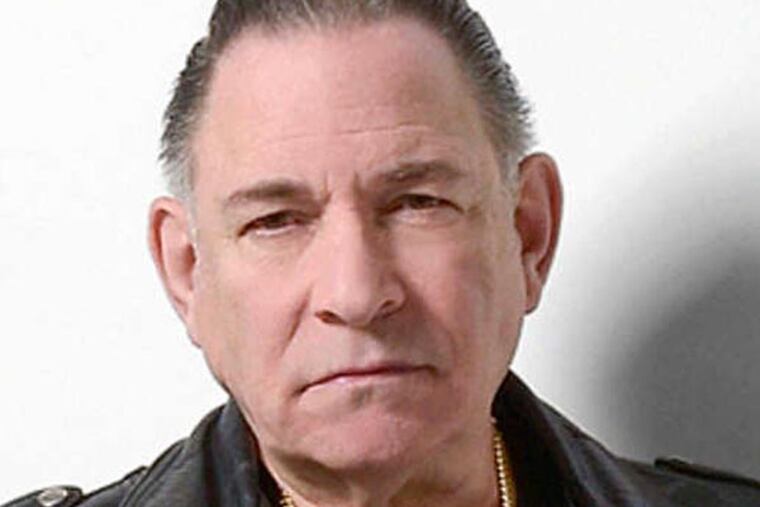Still a rebel after all these years
Robert Gordon has always been a rebel. And not just because the Maryland-born singer's chosen vehicle - rockabilly, raw roots music, raging rock-and-roll - is the standard-bearing sound of insurgence.

Robert Gordon has always been a rebel.
And not just because the Maryland-born singer's chosen vehicle - rockabilly, raw roots music, raging rock-and-roll - is the standard-bearing sound of insurgence.
Gordon's rebellion - from his 1977 debut Robert Gordon With Link Wray to his new I'm Coming Home - comes from the effortless defiance in the music itself. It's not the kind of faux retro-vibe of iconic '50s sounds that you associate with lesser musicians who tackle the roots groove, hard country, and rockabilly of Johnny Horton, Buck Owens, and Little Richard.
On I'm Coming Home (on the Lancaster-based Lanark label) when Gordon sings Owens' "Under Your Spell Again," Richard's "Lucille," even "Walk Hard" from the Judd Apatow-produced film of the same name, there's zealous passion.
Gordon's gives his recordings, which he produces to be freshly modern, a rough tone. "I have a certain in-your-face way of hearing things," says Gordon. "It's pretty raw, but also pretty clean, as opposed to many pseudo-rockabilly things that sound like trash."
Gordon, 67, isn't trying to recreate the past. He's making traditional music with the renegade spirit that's guided his career since its start within the New York City punk scene circa the mid-70s. Though Elvis Presley records were his first love, it was Manhattan club life and the punk act Tuff Darts that allowed his foray onto the stage. Gordon didn't stay with that band for long, but fans of the baritone recall his voice spitting "I'd rather slash my wrist and cut my throat than spend the night with you," on "Slash" from 1976's Live at the CBGB album. "I was doing the rockabilly thing which always seemed to get people off, but I was an angry young man," says Gordon. "I had split from my first wife and punk worked for me. But, I wasn't really into punk. I missed singing those old songs."
Rockabilly could have come across as dated in the time of punk's adrenaline rush. Yet, punk's anything-goes spirit offered Gordon the chance to remake roots music with powerhouse vocals and aggressive guitars. "Hindsight's a beautiful thing," he says stifling a laugh. "The timing was right."
Back to rockabilly it was, especially since Richard Gottehrer spotted Gordon numerous times with Tuff Darts, and signed the singer (not the band) to a management and label (Private Stock) deal. Gottehrer was a producer/songwriter from the celebrated Brill Building, responsible for hits such as "My Boyfriend's Back." His kinship with Gordon was based on their love of everything old-school. "Gottehrer was instrumental in hooking me up with Link [Wray] first, then this cat I heard in London, [Chris] Spedding," says Gordon. "Gottehrer got things done. He found Spedding a green card, and was instrumental in getting me signed to RCA in 1987."
Gordon has an eye for dynamic guitarists. Along with rockabilly innovator Wray and glam-rock shredder Spedding, the singer worked with power-bluegrass six-stringer Danny Gatton. "Spedding was the best. Link was impossible live - he only knew one way to play, full volume - but great in the studio. Danny's a sweetheart, an amazing country picker, but too gymnastic."
Gordon also made the acquaintance of Bruce Springsteen, who gave the crooner his then-unreleased song "Fire" in 1978. "Bruce used to hang out at my fourth-floor walk-up when I broke up with my wife," Gordon says. "We became close friends. If the Pointer Sisters hadn't come along with their version of 'Fire,' we could've had something there."
Gordon believes that elaborate videos made for his versions of songs like Conway Twitty's "It's Only Make Believe," and Marshall Crenshaw's "Someday, Someway," could have "put me over the top," if MTV had paid attention.
"Oh well."
Gordon has since gone the independent route, sounding fresher and bolder than ever with I'm Coming Home. The album was recorded at a studio with Lanark's offices, and Gordon jokes about making an entire album for one-third the cost of one of his RCA-era songs. "If you needed an orchestra, it meant nothing for RCA to drop $30,000. Based on the budget I had for I'm Coming Home and how we recorded it - in pieces, late night because the studio's in a residential-area strip mall - we got a crisp sound." There is an Ennio Morricone-meets-Johnny Cash tone in "Walk Hard," and a swamp-funky feel to several Dibbs Preston tunes.
What does Gordon look for in a song, whether classic or newly written? It's all about the vibe. "You can have great melodies - simple, complex - same with the lyrics," he says. "But no matter what, I have to feel it. It has to groove. It's funny hearing that from a 67-year-old singing 'It's Late' - the irony isn't lost on me - but any song I do has to vibe."
MUSIC
Robert Gordon
8 p.m. Thursday at the Tin Angel, 20 S. Second St. Tickets: $12. Information: 215-928-0978, www.tinangel.com EndText